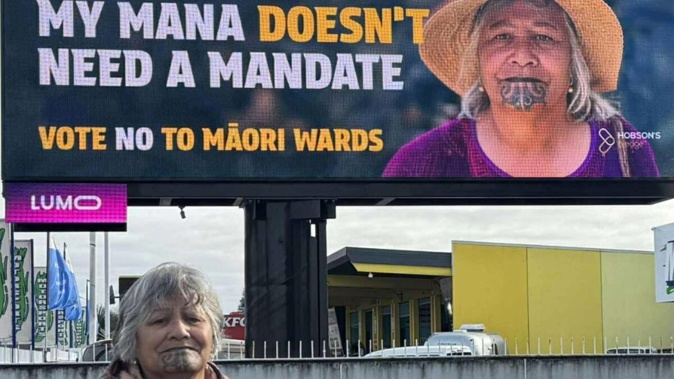
The family of a Rotorua kuia whose image was used on a Hobson’s Pledge billboard without her permission say the political lobby group has trampled on her mana.
Ellen Tamati’s photograph showing her moko kauae appeared on the Hobson Pledge’s billboards with the words: “My mana doesn’t need a mandate, vote no to Māori wards”.
The widower’s family said their nan “fundamentally disagrees” with the billboard’s message and Hobson’s Pledge never asked her permission.
Hobson’s Pledge has removed the billboards after complaints but the widow’s family says they have only offered a “backhanded apology”.
Tamati’s granddaughter, Anahera Parata, told the Rotorua Daily Post her nan was emotionally drained and upset from what had happened.

Rotorua kuia Ellen Tamati is devastated after discovering her image is being used by a political lobby group that’s pushing to abolish Māori wards. Photo / Aukaha News
“They have takahi (trampled) on my nan’s mana and put words in her mouth she did not say.”
Parata said her nan’s image was taken on Waitangi Day this year at a public event and uploaded to photo-sharing website Shutterstock.
The photograph was labelled for editorial purposes only, without extra steps applying for commercial use.
Shutterstock’s website said there were “additional restrictions” for using images of recognisable people for some purposes, including political ads.
“We, the whānau of our mum and nan, are speaking publicly to address the deeply offensive and unauthorised use of her image by Hobson’s Pledge,” Parata said.

This image of Ellen Tamati was posted on the Shutterstock website for purchase. Photo / Shutterstock
“Let us be absolutely clear – our kuia did not give consent for her image to be used. She was never contacted, consulted or approached in any way."
She called on Hobson’s Pledge to issue a public apology to their kuia and whānau and to “reflect seriously on the harm they continue to cause through their deliberate misuse of Māori imagery”.
Parata said her nan had five children, and many grandchildren and great-grandchildren, and was widely known and highly regarded locally.
“She doesn’t want to talk to anyone about it any more today. She is with her best friend at the moment. That is all she wanted to do.”
In a video interview with Aukaha News, the visibly upset kuia said she was woken by phone calls at 1.40am today from a whānau member who had seen the billboard.
“I didn’t know what she was talking about … I didn’t realise my face was on a billboard. She kept saying to me ‘nan what is going on?’” Tamati told Aukaha News.
“I did not give anyone permission to use my mug, my moko kauae ... I’m just lost for words. It is not me, it is not me,” she said while trembling in the interview.
She encouraged people to support Māori wards, “because we need them”.

Another of the Hobson's Pledge Māori Ward billboards at Koutu corner in Rotorua. Photo / Ben Fraser
Hobson’s Pledge released a public statement this morning that said they were aware the woman in the stock image had expressed distress at seeing her photo used.
“The image was legally purchased through a reputable stock photography provider, and all rights to use it in public-facing materials were secured.”
They said they had asked the billboard company to remove the advertisement immediately once they realised the impact on the woman.
“While the campaign intended to promote an important conversation about democratic fairness and equal voting rights for all New Zealanders, we are saddened to see that this billboard has caused personal upset. That was never our intention.”
The statement said Hobson’s Pledge believed in having respectful and constructive conversations about Māori wards.
“We hold the view that race-based electoral divisions are unnecessary and undermine equal suffrage, particularly when many Māori candidates are already successfully elected through general seats at both the local and national level.”
The statement said the group would reach out privately to the individual featured to ensure she was okay and to let her know her image was publicly available on stock image platforms.
“Regardless of the positive message we were promoting, we do not want anyone to feel distressed by our materials.”
Kelly Makiha is a senior journalist who has reported for the Rotorua Daily Post for more than 25 years, covering mainly police, court, human interest and social issues.
Take your Radio, Podcasts and Music with you









